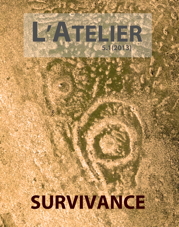Le livre – aller-retour, et au-delà.
Keywords:
Book, Electronic literature, Reading, Hypertext, Interface, Performance, Materiality, Danielewski, Mark, Jackson, Shelley, Tomasula, Steve, Butler, Blake, Bon, François, Drucker, JohannaAbstract
The question of the survival or becoming of the book as an object and technology is one, today, that the rapid and irrevocable progress of the new media raises. Bound as it is, for some, to disappear, can the book still resist and claim an identity all its own? If the computer screen seems to be remediating the book page with no hope of return, is literature for all that condemned to an exclusively virtual future? This paper aims at questioning the boundary between old and new media, with a focus on the book in a context when literary habits are mutating. With what might at first sight have appeared as borderline examples taken from contemporary American fiction, the paper tries to show how new technologies may contribute to emancipating the book from certain constraints. In that regard, it may not be the book so much as the conventional use it is put through that comes to be threatened. As it more and more foregrounds its own materiality, the book thus ceases to be the neutral and invisible medium for textual practices to be instead their definitional interface. “The book” as such may very well be, then, but an abstraction, not to say a fiction which ends up collapsing on itself as soon as its status as a remainder or subsistence is asserted, turning the book-as-object into the singular space of a permanent becoming as well as coming-back.
Avec l’avancée rapide et irrémédiable des nouveaux médias, se pose sans doute aujourd’hui la question de la survie ou du devenir du livre en tan tqu’objet et technologie. Voué pour certains à disparaître, le livre peut-il encore résister et affirmer une identité qui lui soit propre ? Si l’écran semble « remédiatiser » la page sans espoir de retour, la littérature est-elle pour autan tcondamnée à un avenir exclusivement « virtuel », au sens usuel du terme ? Cet article vise à interroger la frontière entre anciens et nouveaux médias à partir de l’exemple du livre dans ce contexte de mutations des pratiques littéraires. A partir d’exemples qu’on aurait pu qualifier de « limites », pris dans la littérature américaine contemporaine, il s’agit demontrer en quoi les nouvelles technologies peuvent contribuer à affranchir le livre de certaines contraintes ; dès lors, ce n’est pas tant le livre qui est menacé que l’usage conventionnel qu’on en fait. Ainsi, en affirmant de plus en plus sa matérialité, le livre cesse peut-être d’être le support neutre et transparent de pratiques textuelles, pour s’en faire plutôt l’interface définitoire. A cet égard, le livre se révèle peut-être rien moins qu’une abstraction, voire une fiction qui s’efface dès lors qu’on parvient à revendiquer son statut de survivance, faisant de l’objet-livre l’espace singulier d’un devenir autant que d’un revenir permanents.
Published
Issue
Section
License
- Work submitted for publication must be original, previously unpublished, and not under consideration for publication elsewhere. If previously published figures, tables, or parts of text are to be included, the copyright-holder's permission must have been obtained prior to submission.
- Authors of accepted manuscripts will assign to L'Atelier the right to electronically distribute their article, or publish it in any form (Internet, CD ROM, printed copy) but authors will retain copyright and, after the article has appeared in L'Atelier, authors may republish their text (in print and/or electronic form) as long as they clearly acknowledge L'Atelier as the original publisher.


